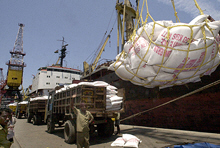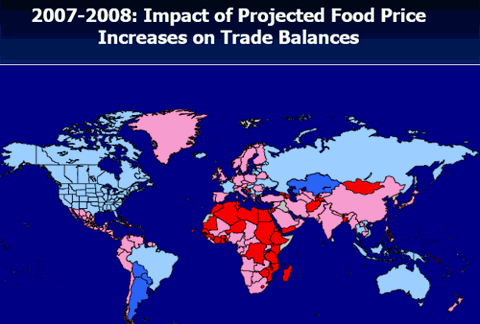
Typical street scene in Santa Ana, El Salvador. (Photo: iStock)
IMF Survey: Food Price Rises Threaten Efforts to Cut Poverty—Strauss-Kahn
April 10, 2008
- Higher food prices have particularly adverse effect on the poor
- Projections show nearly all African countries suffering food price shocks
- IMF Spring Meetings to discuss global strategy on food price crisis
A rise in food prices of 48 percent since end-2006 is a huge increase that may undermine gains the international community has made in reducing poverty, IMF Managing Director Dominique Strauss-Kahn warned.

In Africa and Asia, higher food prices undermine fight against poverty, represent new kind of imbalance (photo: Dibyangshu Sarkar/AFP)
HIGHER COMMODITY PRICES
He told an April 10 news conference in Washington that policy responses to higher food prices have to be tailored to meet the needs of each country.
Strauss-Kahn said the IMF could take four steps to help address higher food prices in the short term:
• Support countries in designing appropriate macroeconomic policies to deal with shocks
• Provide advice and technical assistance for countries where rising food prices are eroding terms of trade, through targeted income support for the poor—without jeopardizing hard-won gains on economic stabilization
• In countries where price shocks are affecting the balance of payments, provide assistance through IMF lending facilities
• Work, along with other agencies and donors, to help countries mitigate negative impacts.
Open trade policies
Longer-term answers to the problem of higher food prices centered on removing obstacles to increased supply, Strauss-Kahn said.
The IMF cites increased trade as a policy option for mitigating the effects of higher commodity prices on national economies. IMF chief economist Simon Johnson told an April 9 World Economic Outlook briefing: "As a way to reduce global pressure on food and energy prices, more open trade policies in those products would be a good start. Less insular biofuels policy in advanced economies would help relieve some pressure. At the same time, we encourage countries to avoid raising taxes or imposing quotas on their food exports. These reduce incentives for domestic producers and also increase international prices."
Impact on inflation
IMF research shows that higher prices for food pose new challenges for African policymakers and could have particularly adverse effects on the poor. Because food represents a larger share of what poorer consumers buy, a global increase in food prices has a bigger impact on inflation in poorer countries.
IMF studies show the rise in food prices reflecting a mixture of longer-term factors such as food crops being diverted to biofuel production; higher food demand from emerging economies; and higher energy and fertilizer costs. Temporary factors, such as droughts, floods, and political instability, also contributed to higher food prices.
Strauss-Kahn displayed a map at the press briefing that showed the impact of projected food price increases on global trade balances (see chart).

Map displayed at press briefing: countries in red expected to suffer biggest trade balance losses from higher food prices; countries in blue expected to show biggest gains
"Almost all African countries have a negative impact from these food prices," Strauss-Kahn told the briefing. A problem in trade balances meant problems in current accounts. Problems in current accounts meant problems that the IMF could help address, he said.
New projections on the effects of higher food prices follow publication of a World Bank-IMF report warning that most countries will fall short on the Millennium Development Goals, a set of eight globally agreed development targets that the international community is aiming to achieve by 2015. The report said that though much of the world is set to cut extreme poverty in half by then, prospects are gravest for the goals of reducing child and maternal mortality, with serious shortfalls also likely in primary school completion, nutrition, and sanitation goals.
New kind of imbalance
In Africa and Asia the effect of higher food prices would have to be seen not only in terms of undermining the efforts to fight against poverty but also as representing a new kind of macroeconomic imbalance, Strauss-Kahn said. For a large part of Africa, a shock could be expected that was as big as, and maybe bigger than, previous shocks.
Strauss-Kahn welcomed an initiative launched by U.K. Prime Minister Gordon Brown that urges the IMF, the World Bank, and the United Nations to develop a global strategy to address higher food prices. "The initiative taken by Gordon Brown is perfectly timely, We need now to consider the rise in food prices as something which is not just happening for one or two months but as probably more structural," Strauss-Kahn said.
The Brown proposal would probably be on the agenda of the IMF-World Bank Spring Meetings and of the ministerial meeting of the Group of Seven industrial countries, he added.
Comments on this article should be sent to imfsurvey@imf.org


